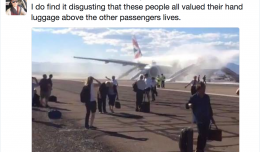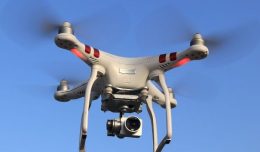Every pilot will eventually have their own story. It’s that one day when something or everything went horribly wrong as Murphy’s Law ruled the day. The mere fact that they’re alive to talk about it reaffirms that whatever action they took, right or wrong, it got them back on the ground. However, dealing with the incident afterward in your mind is just as important as dealing with the original emergency. It’s learning how to not be afraid of fear.
For some pilots, a scary incident will sustain their pucker factor (it’s using muscles you didn’t know you had until something tries to scare the crap out of you) at a high level and, quite often, this is where students drop out of flight school. Holding a high pucker factor (HPF) will keep you so tight you can’t see the facts and you will react without thought or input from the reality around you. The perceptions of high pucker factor override reality and they let fear be their captain instead of their passenger. They might get up in the air again and fly a little, but the fear that was triggered during a previous incident will overwhelm the present moment and ground their dreams forever – they just can’t enjoy flying again. It’s not just student pilots. I know a few pilots with thousands of hours who got scared enough in the sky to set the plane down and never fly again. Their pucker factor hit the high end of the scale and got stuck there. They couldn’t put the incident in a context they could live with.
Pilots have fear during emergencies because they’re supposed to. It doesn’t mean the cool calm pilot voice saying, “Don’t worry folks, we only need one engine to fly…” isn’t freaking out somewhere inside, but good pilots learn to override their emotions and become part of the situation. Pilots know that panicking is irrational and won’t fix the flaming engine. Fear heightens our senses in moments of complexity but with enough training; pilots instinctively know what to do, even if the emergency is unique and doesn’t follow a standard emergency checklist. Good pilots learn to perceive emergency situations differently than others because they believe they can handle the situation. Why be afraid if you think you can handle it? The type of person that is generally drawn to the cockpit is usually more able at process fear because pilots are generally less emotional and push fear aside because it gets in the way of the facts.
An incident is happening in the time that it took for you to read this. Somewhere, a pilot is saying “whoops,” but it’s usually just a moment of learning. For example, a pilot wrote to me and briefly mentioned that as a commercial student, he was flying solo and while turning base to final at 500 feet, he stalled the airplane. He recovered at 200 feet. It obviously shook him up, but he got back in the cockpit a while later and was still shaken by the incident. He was wondering if that feeling would go away. The answer is: it depends on your own pucker factor and your ability to rationally process what happened. In this instance, I’m assuming he had no mechanical issues so it was purely pilot induced. I’m also assuming that this incident was significant enough that this pilot will never, ever let his airspeed get so low by accident again. If he can sit down with his thoughts and put the incident in terms of learning and realize that he did react properly by recovering from the stall, then he will be able to move away from anxiety to a heightened respect for his own situational awareness.
There are different kinds of fear which causes physical reactions and anyone who has ever walked into a full-motion flight simulator can smell what I mean. People sweating from exercise smell different than those that are sweating from stress or fear. Pilots know the simulator is on the ground and they’re not going to die, but it feels real enough to trigger instinctual fear. Pilots need that to learn how to deal with emergencies with proactive thought rather than reactive actions. While unknowingly learning how to do this, pilots walk out with “simulator breath” and psychological overload and it often takes a while to come down from the elevated level of thinking, even though it’s just a box on the ground.
Pilots should not try to delete or forget those memories in the cockpit that scared them; rather, pilots should actively think through those moments while they’re safely on the ground. Flight instructors need to help guide these talks with their students. Determine what went wrong and then visualize doing it all again, perfectly. Your past pucker moments will be the basis for all your future decision making, so treat them well. Those moments will guide you to make the right decisions in the future so honor your mistakes, learn from them, and share your learning with others.
Erika Armstrong has been in aviation for twenty-five years. From the front desk of a busy FBO to the captain’s seat of a commercial airline, she’s experienced everything in between. Her manuscript “A Chick in the Cockpit” was purchased by a publisher and will be out in 2015. If you have a story or comment, she can be reached at [email protected]







